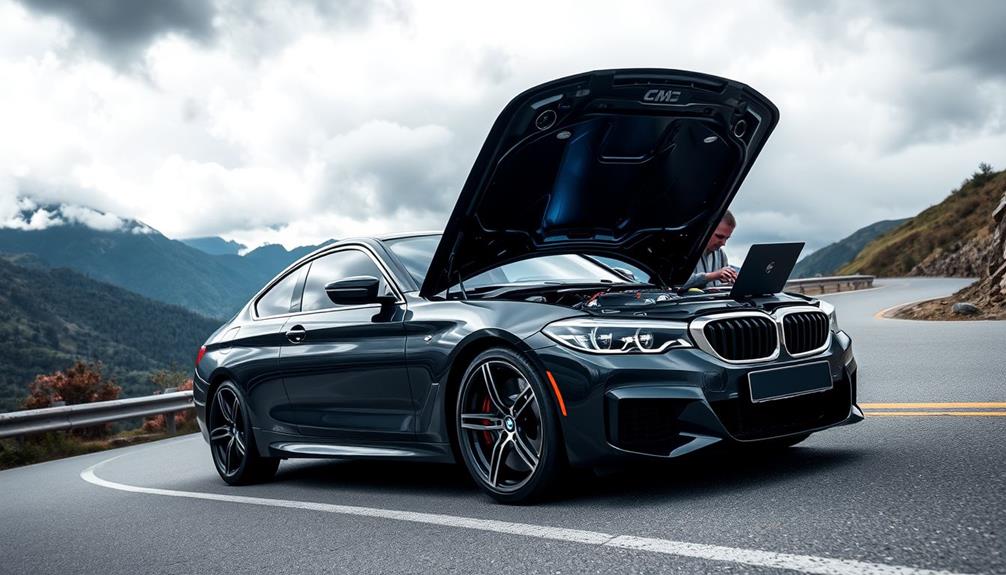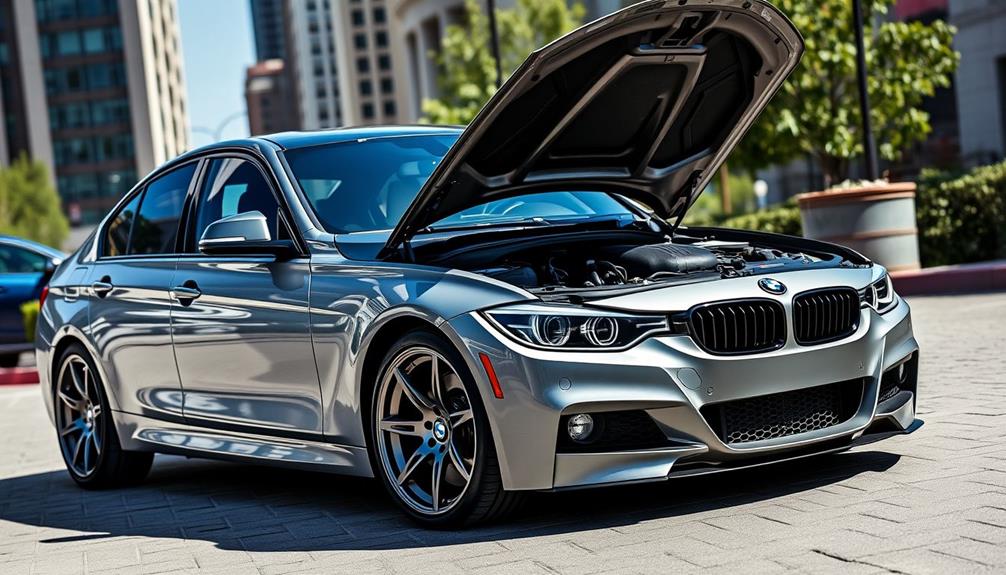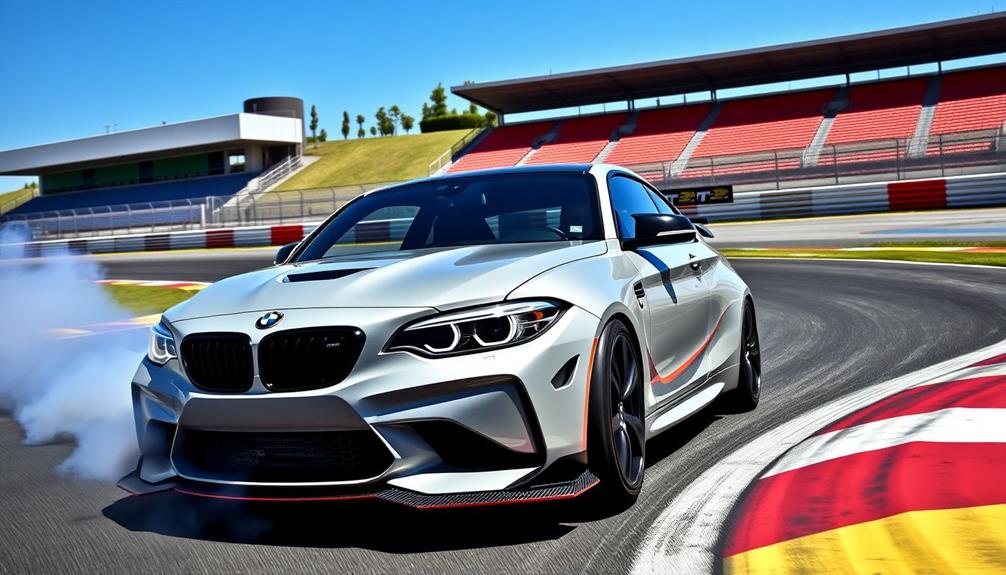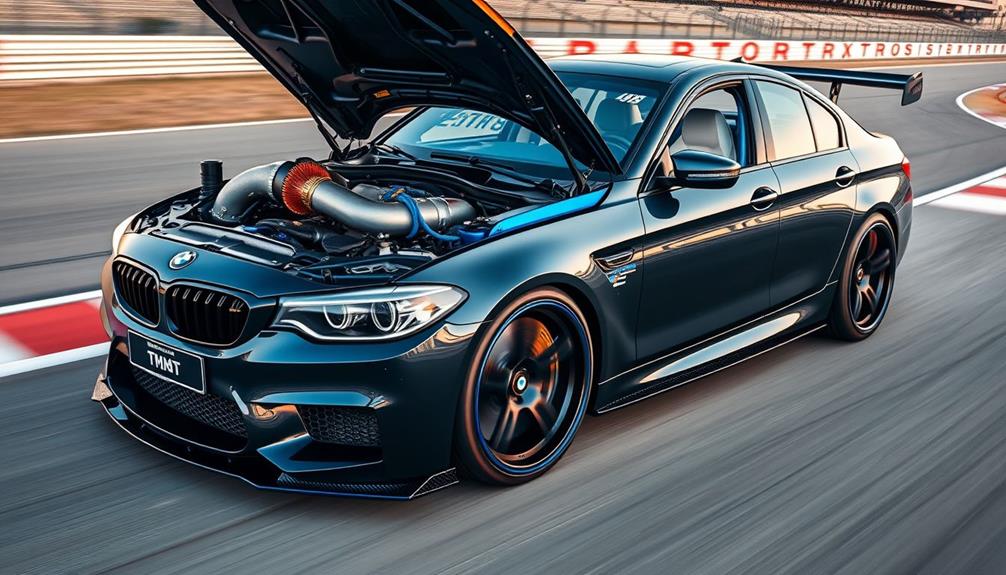BMW chip tuning is a simple upgrade to release extra power from your car. By modifying the ECU software, you can boost performance greatly—typically increasing horsepower by 10% to 30%. A Stage 1 tune may gain around 17 HP, while advanced options can push the output even higher. You'll also enjoy improved throttle response and fuel efficiency. It's important to combine tuning with good maintenance and possibly hardware upgrades, like intercoolers, to maximize benefits. There's a lot more to reflect on for ideal results, so keep exploring the best practices for your BMW tuning journey!
Key Takeaways
- BMW chip tuning modifies ECU software, enhancing performance and unlocking potential power increases of 10% to 30%.
- Stage 1 tuning can boost horsepower by approximately 17 HP, with advanced stages yielding even more.
- Pairing tuning with upgrades like intercoolers and high-flow downpipes can maximize performance gains.
- Regular monitoring and maintenance of engine parameters are essential for longevity and reliability post-tuning.
- Improved throttle response and fuel efficiency are additional benefits of chip tuning, enhancing overall driving experience.
Understanding BMW Chip Tuning
Understanding BMW chip tuning can transform your driving experience by enhancing your vehicle's performance. When you explore BMW N20 engine tuning, you're modifying the engine's ECU software to improve various performance parameters. This means you can increase horsepower and torque, giving you a more dynamic drive.
For instance, the N20 engine can generate anywhere from 154 to 241 HP, and with tuning, you can push those numbers even higher. Common methods like ECU chip tuning allow for precise adjustments to boost pressure, fuel injection, and ignition timing. These tweaks lead to noticeable gains in efficiency and performance.
If you opt for Stage 1 tuning, you might see an increase of around 17 HP, while advanced stages could provide even greater improvements—especially with the right hardware modifications.
However, it's crucial to keep up with regular maintenance and monitor engine parameters after tuning. Higher performance levels can elevate operating temperatures and strain components, so ensuring reliability and longevity should be a priority.
Embracing BMW N20 engine tuning can truly elevate your driving experience, but it's important to be mindful of the responsibilities that come with it.
Benefits of ECU Remapping
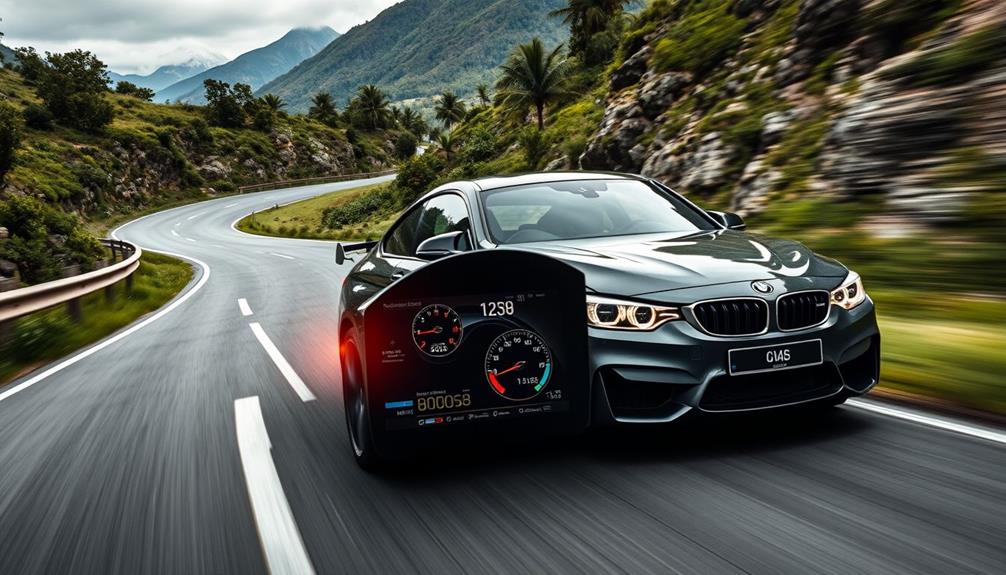
When you choose ECU remapping, you can expect a noticeable boost in engine performance, often achieving power increases of 10% to 30%.
You'll also enjoy enhanced throttle response, making acceleration smoother and more enjoyable.
Plus, many drivers find that they experience fuel efficiency gains, as the tuning optimizes combustion for better economy.
Improved Engine Performance
ECU remapping offers a straightforward way to boost your BMW's engine performance, delivering benefits you can truly feel on the road.
With chip tuning, you can release up to 17 additional horsepower from your BMW N20 engine using Stage 1 software, greatly enhancing your vehicle's overall performance. The process optimizes fuel injection and ignition timing, which not only increases power but can also reduce fuel consumption during everyday driving.
You'll also notice significant torque gains—improving from 340 ft-lbs to over 400 ft-lbs—transforming your driving dynamics. This extra torque makes acceleration feel more responsive and confident, perfect for those merging onto highways or overtaking slower vehicles.
Additionally, ECU remapping can help lower operating temperatures, potentially extending your engine's lifespan by minimizing the risk of overheating and reducing the frequency of services.
This means you can enjoy the thrill of driving while also ensuring your BMW remains reliable and efficient. Ultimately, chip tuning provides a practical upgrade that enhances both performance and longevity, making your driving experience more enjoyable.
Enhanced Throttle Response
After experiencing the improvements in engine performance from ECU remapping, you'll appreciate how it also enhances throttle response. This upgrade considerably reduces throttle lag, potentially improving your acceleration times by 0.5 to 1 second.
You'll notice a more responsive driving experience, allowing you to accelerate quicker during overtaking and merging maneuvers.
With enhanced throttle response, your confidence on the road will soar, especially in traffic and on highways where quick passing is essential. Companies like PedalBox and Pedal Commander specialize in throttle response tuning, optimizing your vehicle's electronic throttle control for better power delivery.
This tuning makes a noticeable difference in how your BMW reacts to your inputs. With improved passing response at speed, you'll find it easier to navigate tight situations without hesitation.
Overall, remapping your ECU for throttle response not only boosts performance but also creates a more engaging and dynamic driving experience. You'll enjoy every moment behind the wheel, feeling the thrill of your BMW responding instantly to your commands.
Embrace the upgrade, and experience driving like never before!
Fuel Efficiency Gains
How much could you save at the pump with optimized fuel efficiency? By investing in a tuning service like ECU remapping, you can potentially enhance your BMW's fuel efficiency by 10-15%.
This upgrade fine-tunes fuel injection and ignition timing, allowing your engine to operate more efficiently. You'll notice better throttle response and smoother acceleration, which translates to reduced fuel consumption in your daily driving.
For instance, by improving the air-fuel mixture ratios in your BMW N20 engine, ECU remapping enables more complete combustion, minimizing wasted fuel.
Many drivers report not just an increase in power but also lower fuel costs after remapping. It's a cost-effective upgrade that pays off over time.
Furthermore, studies indicate that proper tuning can notably decrease emissions as your engine burns fuel more effectively, consuming less per mile.
Tuning Methods Explained
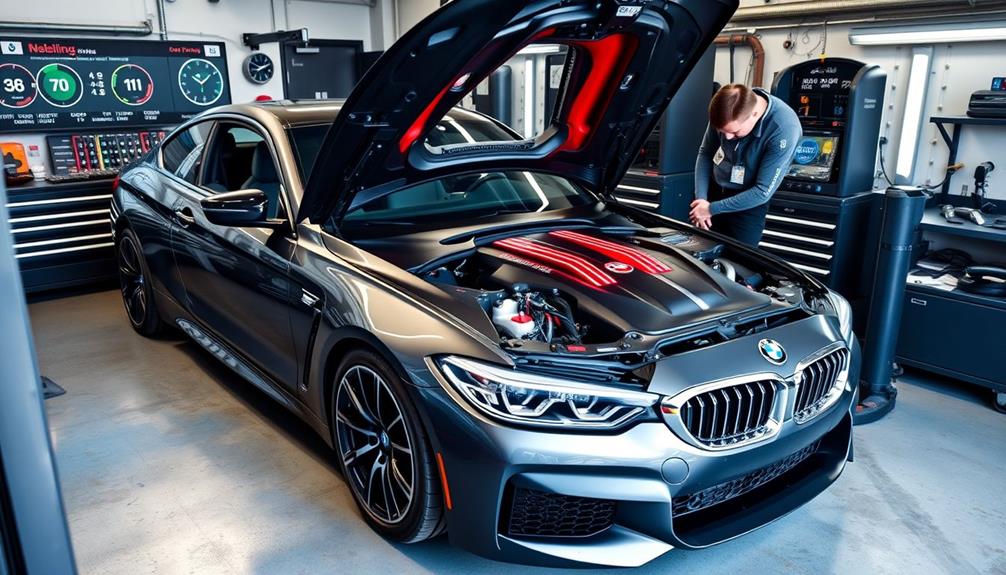
When considering tuning methods for your BMW, it's essential to understand the different approaches available and their implications for performance. One popular method is ECU chip tuning, which modifies your vehicle's original software settings. This allows for deep adjustments in power, torque, and efficiency, leading to significant performance gains during a tuning session.
Another approach is piggyback tuning. While it can increase boost pressure and provide noticeable power boosts, it often compromises your vehicle's safety and long-term reliability due to less precise control over engine parameters.
Additionally, high intake air temperatures in models like the N20 can complicate reliable tuning, making intercooler installation essential for peak performance.
For those looking for substantial improvements, Stage 2 tuning combines ECU changes with hardware upgrades, such as intercoolers and downpipes. This method can result in impressive increases in horsepower and torque.
Regardless of the tuning method you choose, careful consideration of key parameters—like boost pressure, fuel injection, ignition timing, and valve systems—is significant. Balancing performance with engine longevity guarantees you get the most out of your tuning session without risking damage to your BMW.
Performance Gains and Expectations

Understanding the performance gains you can expect from BMW chip tuning is essential for any enthusiast looking to enhance their driving experience. When you opt for tuning, you're not just boosting horsepower; you're transforming the entire driving dynamic of your vehicle.
Here's what you can typically expect:
- Increased Power: Boost your BMW N20 engine's output from 241 HP to around 290 HP with the right software adjustments.
- Enhanced Throttle Response: Experience quicker acceleration and a more engaging drive.
- Improved Mid-Range Torque: Feel the difference in everyday driving conditions with better responsiveness.
- Maximized Gains: Combine tuning with an intercooler for an extra 16 HP at higher RPMs.
With Stage 1 chip tuning alone, you'll see an increase of about 17 HP without major hardware changes.
Regular dyno testing shows that with further modifications, your tuned N20 can reach impressive levels of up to 425 HP.
This means you're not just getting numbers; you're getting a whole new level of excitement and performance from your BMW.
Safety Considerations

Safety considerations are vital when diving into BMW chip tuning, as boosting your engine's output can lead to significant performance enhancements or potential risks.
First and foremost, confirm that your vehicle's components, particularly the cooling system and fuel delivery, can handle the extra power. Overheating or engine damage can occur if these systems aren't up to the task.
Proper tuning involves careful adjustments to ignition timing and boost pressure. Incorrect settings may cause pre-ignition or knocking, which can severely impact your engine's longevity.
Using high-quality fuel post-tuning is important; subpar fuel can lead to inconsistent combustion and reduced performance, undermining the advantages of your upgrade.
Consider using ECU chip tuning over piggyback systems, as it allows for deeper adjustments, but make sure a qualified professional handles the tuning to guarantee safety and reliability.
Additional Upgrades for Power

Boosting your BMW's power isn't just about chip tuning; there are several additional upgrades that can enhance your performance. By implementing these enhancements, you'll notice not only increased power but also improved efficiency.
- Intercooler Installation: Lowers intake air temperatures, enhancing air density and combustion for better power output.
- High-Flow Downpipes: Improves exhaust flow, potentially adding around 10 HP when paired with other mods.
- Performance Air Filters: Increases airflow into the engine, yielding a slight power boost and supporting overall efficiency.
- Stage 2 Tuning: Combines software adjustments with hardware upgrades, aiming for around 425 HP with components like upgraded intercoolers and exhaust systems.
Monitoring your intake temperatures after these upgrades is essential. It helps maintain peak performance and prevents engine knock, ensuring your engine's longevity.
These additional upgrades for power can transform your driving experience, making it more exhilarating while maximizing the benefits of your chip tuning. Embrace these modifications, and watch your BMW release its full potential! Aftermarket exhaust systems and intake upgrades are just a few ways to increase power with BMW 328I tuning. By allowing your engine to breathe more efficiently, these modifications can significantly enhance performance and overall driving dynamics. Don’t miss out on the opportunity to elevate your driving experience with these power-boosting enhancements.
Community Insights and Experiences

When you plunge into the world of BMW chip tuning, you'll quickly discover a vibrant community filled with passionate enthusiasts enthusiastic to share their experiences. Many members boast significant power increases after chip tuning, with Stage 1 software often boosting output by around 17 HP.
You'll find that discussions frequently highlight the importance of pairing chip tuning with hardware upgrades, like intercoolers, to achieve ideal performance gains. User-generated content on forums showcases the benefits of improved throttle response and smoother acceleration that follow tuning modifications.
Feedback from experienced tuners emphasizes the need for regular dyno testing to validate performance improvements and guarantee reliability post-tuning. This practice helps you gauge how your modifications are affecting your vehicle's performance, which is essential for maintaining engine health.
However, it's also important to heed the cautionary advice shared within the community regarding the impact of high intake air temperatures on engine longevity. Proper cooling solutions are crucial for maintaining performance and reliability, especially when pushing your BMW to its limits.
Engaging with this community can provide you with quite high insights that fuel your passion for performance upgrades.
Frequently Asked Questions
How Do You Increase Horsepower in a Bmw?
To increase horsepower in your BMW, consider ECU tuning, installing a performance intercooler, or upgrading components. Regular dyno testing helps you track improvements, ensuring your modifications effectively enhance performance and deliver the power you crave.
How to Make a BMW Go Faster?
To make your BMW go faster, consider clever upgrades like chip tuning, intercoolers, and exhaust enhancements. These modifications boost performance and power, giving you a thrilling driving experience you won't forget. Enjoy the ride!
How Much Horsepower Does the BMW N20 Have?
The BMW N20 engine delivers between 154 to 241 horsepower, depending on the variant. If you're considering performance options, the N26 variant for US models reaches the peak output of 241 horsepower with 350 Nm of torque.
How to Improve BMW Performance?
To improve your BMW's performance, consider upgrading your intercooler, tuning the ECU, and optimizing fuel delivery. These steps enhance throttle response and acceleration, giving you a more exhilarating driving experience without major hardware changes.
Conclusion
In summary, BMW chip tuning can transform your driving experience, revealing impressive power with just a simple upgrade. Did you know that many drivers report gains of up to 30% in horsepower after ECU remapping? That's a noticeable difference that can elevate your ride. Just remember to prioritize safety and consider complementary upgrades for even better performance. Immerse yourself in the tuning community, and you'll discover a wealth of insights to enhance your BMW further!
